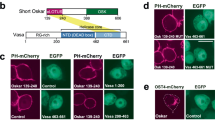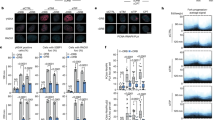Abstract
DEREGULATION of cell proliferation is a hallmark of neoplastic transformation. Alteration in growth control pathways must translate into changes in the cell-cycle regulatory machinery, but the mechanism by which this occurs is largely unknown. Compared with normal human fibroblasts, cells transformed with a variety of viral oncoproteins show striking changes in the subunit composition of the cyclin-dependent kinases (CDKs)1. In normal cells, CDKs exist predominantly in multiple quaternary complexes, each containing a CDK, cyclin, proliferating cell nuclear antigen and the p21 protein. However, in many transformed cells, proliferating cell nuclear antigen and p21 are lost from these multiprotein enzymes. Here we have investigated the significance of this phenomenon by molecular cloning of p21 and in vitro reconstitution of the quaternary cell-cycle kinase complexes. We find that p21 inhibits the activity of each member of the cyclin/CDK family. Furthermore, over expression of p21 inhibits the proliferation of mammalian cells. Our results indicate that p21 may be a universal inhibitor of cyclin kinases.
This is a preview of subscription content, access via your institution
Access options
Subscribe to this journal
Receive 51 print issues and online access
$199.00 per year
only $3.90 per issue
Buy this article
- Purchase on Springer Link
- Instant access to full article PDF
Prices may be subject to local taxes which are calculated during checkout
Similar content being viewed by others
References
Xiong, Y., Zhang, H. & Beach, D. Genes Dev. 7, 1572–1583 (1993).
Sherr, C. Cell 73, 1059–1065 (1993).
Draetta, G. Trends biochem. Sci. 15, 378–383 (1990).
Xiong, Y., Zhang, H. & Beach, D. Cell 71, 505–514 (1992).
Zhang, H., Xiong, Y. & Beach, D. Molec. Biol. Cell 4, 897–906 (1993).
Matsushime, H. et al. Cell 71, 323–334 (1992).
Zhu, L. et al. Genes Dev. 7, 1111–1125 (1993).
Kastan, M. B. et al. Cell 71, 587–597 (1992).
Kawasaki, H., Emori, Y. & Suzuki, K. Analyt. Biochem. 191, 332–336 (1990).
Xiong, Y., Menninger, J., Beach, D. & Ward, D. Genomics 13, 575–584 (1992).
Hannon, G. J., Demetrick, D. & Beach, D. Genes Dev. 7, 2378–2391 (1993).
Draetta, G. & Beach, D. Cell 54, 17–26 (1988).
Ewen, M. E. et al. Cell 73, 487–497 (1993).
Author information
Authors and Affiliations
Rights and permissions
About this article
Cite this article
Xiong, Y., Hannon, G., Zhang, H. et al. p21 is a universal inhibitor of cyclin kinases. Nature 366, 701–704 (1993). https://doi.org/10.1038/366701a0
Received:
Accepted:
Issue Date:
DOI: https://doi.org/10.1038/366701a0
This article is cited by
-
A novel avian intestinal epithelial cell line: its characterization and exploration as an in vitro infection culture model for Eimeria species
Parasites & Vectors (2024)
-
Identifying hub genes of sepsis-associated and hepatic encephalopathies based on bioinformatic analysis—focus on the two common encephalopathies of septic cirrhotic patients in ICU
BMC Medical Genomics (2024)
-
SNORD6 promotes cervical cancer progression by accelerating E6-mediated p53 degradation
Cell Death Discovery (2023)
-
A dual role of RBM42 in modulating splicing and translation of CDKN1A/p21 during DNA damage response
Nature Communications (2023)
-
SGF29 nuclear condensates reinforce cellular aging
Cell Discovery (2023)
Comments
By submitting a comment you agree to abide by our Terms and Community Guidelines. If you find something abusive or that does not comply with our terms or guidelines please flag it as inappropriate.



